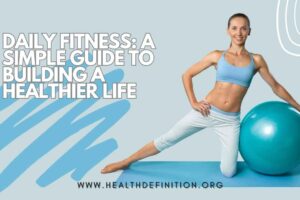
Discover the immense benefits of exercise and fitness in leading a healthier and more fulfilling life. This article explores how regular physical activity boosts physical and mental health, reduces the risk of chronic diseases, enhances mood, and improves overall quality of life. Learn why fitness is essential and how you can integrate it into your daily routine for long-term well-being.
Introduction
Exercise and fitness play a crucial role in maintaining overall health and well-being. In today’s fast-paced world, where sedentary lifestyles are becoming increasingly common, it is essential to incorporate regular physical activity into daily life. Fitness not only helps in maintaining an ideal weight but also improves cardiovascular health, mental well-being, and overall longevity. This article delves into the importance of exercise and fitness, highlighting their benefits and offering practical tips on how to stay active.
1. Physical Health Benefits of Exercise
a) Improves Cardiovascular Health
Regular physical activity strengthens the heart and improves blood circulation, reducing the risk of heart diseases, high blood pressure, and strokes. Aerobic exercises like running, swimming, and cycling enhance heart efficiency, promoting better oxygen supply to the body.
b) Helps in Weight Management
Exercise is a key factor in weight control. It burns calories, boosts metabolism, and helps in maintaining a healthy body composition. Combined with a balanced diet, physical activity can prevent obesity and related health issues such as diabetes and joint problems.
c) Strengthens Muscles and Bones
Strength training exercises, such as weightlifting, yoga, and resistance workouts, enhance muscle mass and bone density. This is particularly crucial in preventing osteoporosis and age-related muscle loss.
d) Enhances Immune System
Moderate exercise helps in boosting immunity by improving circulation and promoting the efficient transport of white blood cells. This reduces the risk of infections and illnesses, keeping the body resilient.
2. Mental and Emotional Benefits of Exercise
a) Reduces Stress and Anxiety
Physical activity is a natural stress reliever. Exercise releases endorphins, also known as “feel-good” hormones, which help reduce stress, anxiety, and depression.
b) Boosts Brain Function
Regular exercise enhances cognitive functions, memory, and concentration. Activities like aerobic workouts increase blood flow to the brain, lowering the risk of neurodegenerative diseases like Alzheimer’s.
c) Improves Sleep Quality
A physically active lifestyle promotes better sleep patterns. Exercise helps in regulating the sleep cycle, reducing insomnia, and ensuring deeper and more restful sleep.
d) Enhances Self-Esteem and Confidence
Fitness contributes to a positive body image and self-esteem. Engaging in regular workouts helps individuals feel more accomplished, confident, and motivated in other aspects of life.

3. The Social Benefits of Fitness
Exercise also fosters social interaction and engagement. Whether through group workouts, fitness classes, or sports, staying active allows individuals to connect with like-minded people, improving social well-being and emotional support.
4. Practical Tips for Integrating Fitness into Daily Life
- Start with Small Goals: Begin with short workouts and gradually increase intensity and duration.
- Choose Activities You Enjoy: Engaging in enjoyable activities like dancing, swimming, or hiking keeps motivation high.
- Make Exercise a Habit: Incorporate fitness into your daily routine, such as taking stairs instead of elevators or walking instead of driving for short distances.
- Stay Consistent: Consistency is key to reaping long-term benefits. Schedule workouts and stay committed.
What is the meaning of exercise and fitness?
Exercise refers to planned, structured, and repetitive physical activity that aims to improve or maintain physical fitness. It includes activities like running, weightlifting, yoga, and swimming.
Fitness is the overall state of health and well-being, achieved through regular exercise, proper nutrition, and a healthy lifestyle. It includes components like strength, endurance, flexibility, and cardiovascular health.
Why is exercise and fitness important?
Exercise and fitness are essential for overall health and well-being. Here are some key reasons why they matter:
Physical Health Benefits
- Improves Heart Health – Regular exercise strengthens the heart, lowers blood pressure, and reduces the risk of cardiovascular diseases.
- Helps with Weight Management – Exercise burns calories, helps maintain a healthy weight, and prevents obesity-related conditions.
- Boosts Immune System – Staying active enhances the body’s ability to fight infections and illnesses.
- Strengthens Muscles and Bones – Weight-bearing exercises improve bone density and reduce the risk of osteoporosis.
- Reduces Risk of Chronic Diseases – Exercise lowers the chances of developing diabetes, stroke, and some cancers.
Mental Health Benefits
- Reduces Stress and Anxiety – Physical activity helps regulate stress hormones and promotes relaxation.
- Boosts Mood – Exercise releases endorphins (the “feel-good” hormones) that improve happiness and reduce depression.
- Improves Sleep Quality – Regular activity helps you fall asleep faster and enjoy deeper sleep.
- Enhances Brain Function – Exercise improves memory, focus, and overall cognitive function.
Lifestyle and Longevity Benefits
- Increases Energy Levels – Regular movement enhances stamina and reduces fatigue.
- Improves Flexibility and Mobility – Stretching and movement help maintain range of motion and prevent stiffness.
- Enhances Quality of Life – Fitness allows for more independence, enjoyment of activities, and better aging.
- Promotes Social Interaction – Group fitness, sports, and outdoor activities help build connections with others.

What are 10 benefits of exercise?
Exercise is not just about physical activity; it is a key to a healthier, happier, and more fulfilling life. Regular exercise has numerous positive effects on both body and mind. Let’s explore 10 incredible benefits of exercise—
1. Strengthens the Heart
Regular exercise improves blood circulation, regulates blood pressure, and reduces the risk of heart disease.
2. Enhances Mental Well-being
Physical activity triggers the release of endorphins, the “happy hormones,” which help reduce stress, anxiety, and depression.
3. Helps in Weight Management
Exercise burns calories, making it easier to lose weight or maintain a healthy body weight.
4. Strengthens Muscles and Bones
Weight-bearing exercises increase bone density, strengthen muscles, and reduce the risk of osteoporosis.
5. Boosts Immunity
Regular workouts enhance the immune system, helping the body fight infections and diseases more effectively.
6. Improves Sleep Quality
People who exercise regularly fall asleep faster and enjoy deeper, more restful sleep.
7. Increases Energy and Stamina
Exercise and Fitness helps reduce fatigue, increase endurance, and improve overall energy levels.
8. Enhances Brain Function
Regular physical activity improves memory, sharpens focus, and reduces the risk of cognitive decline and Alzheimer’s disease.
9. Promotes Longevity
Studies show that regular Exercise and Fitness can increase lifespan and lower the risk of chronic diseases.
10. Improves Posture and Flexibility
Stretching and balance exercises enhance body stability, correct posture, and reduce the risk of injuries.
How much exercise per day?
The amount of Exercise and Fitness you should aim for each day depends on your fitness goals, age, and overall health. However, general guidelines suggest:
For overall health:
- 150 minutes of moderate-intensity exercise or 75 minutes of vigorous-intensity exercise per week, which breaks down to about 30 minutes a day, five times a week.
- Alternatively, you can do a mix of both moderate and vigorous activities.
For weight loss or weight management:
- You may need to increase the intensity or duration of exercise. Aim for 300 minutes of moderate-intensity exercise or 150 minutes of vigorous-intensity exercise per week. That would be about 60 minutes a day, five times a week.
Strength training:
- Include strength training exercises for all major muscle groups at least two days a week. This could be through bodyweight exercises, weightlifting, or resistance training.
Flexibility and balance:
- Incorporating flexibility exercises (like yoga or stretching) or balance exercises a few times a week can also improve overall fitness and reduce the risk of injury.
Conclusion
Exercise and fitness are fundamental to living a healthy, balanced life. Beyond physical health, they enhance mental well-being, boost confidence, and improve overall quality of life. By making Exercise and Fitness a priority and integrating it into daily routines, individuals can enjoy a healthier and more fulfilling lifestyle. Start today, stay active, and embrace the lifelong benefits of fitness!
key points about exercise and fitness:
-
Improves Cardiovascular Health: Regular physical activity strengthens the heart, improves circulation, and lowers the risk of heart disease, stroke, and high blood pressure.
-
Builds Muscle and Strength: Strength training and resistance exercises help increase muscle mass, enhance endurance, and improve overall body strength.
-
Boosts Mental Health: Exercise and Fitness releases endorphins, which help reduce stress, anxiety, and depression, promoting better mood and mental clarity.
-
Enhances Flexibility and Mobility: Regular stretching and mobility exercises improve joint flexibility, reduce stiffness, and prevent injuries.
-
Supports Weight Management: Exercise, along with a healthy diet, plays a crucial role in burning calories and maintaining a healthy body weight.

(FAQs) about Exercise and Fitness:
How much exercise do I need per week?
The World Health Organization (WHO) recommends at least 150–300 minutes of moderate-intensity exercise or 75–150 minutes of vigorous-intensity exercise per week, along with muscle-strengthening activities at least twice a week.
What are the best exercises for beginners?
Beginners should start with low-impact exercises such as:
- Walking (30 minutes a day)
- Bodyweight exercises (squats, lunges, push-ups)
- Yoga or stretching for flexibility
- Light cardio (cycling, swimming)
Gradually increase intensity as fitness improves.
Can exercise help with weight loss?
Yes! Exercise helps burn calories and build muscle, which boosts metabolism. Combining Exercise and Fitness with a healthy diet is the most effective way to lose and maintain weight. Cardio + strength training is a great approach.
Is it okay to work out every day?
Yes, but it’s essential to vary workouts and allow certain muscle groups time to recover. A mix of strength training, cardio, and flexibility exercises ensures balance and prevents injuries. Active rest days with light activities like walking or yoga are beneficial.
How can I stay motivated to exercise regularly?
- Set clear goals (weight loss, strength, endurance, etc.)
- Find a workout buddy for accountability
- Choose activities you enjoy to make it fun
- Track progress using apps or a journal
- Reward yourself for reaching milestones






